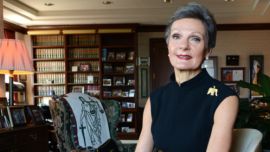They are no longer what they were. Since Alberto Fernández came to power, his Cabinet has been mutating, suffering casualties to the detriment of his leadership. He lost officials and civil servants who were unconditional allies and had to remove loyalists due to internal disputes with the Kirchnerite wing of the coalition. The latest case was that of Matías Kulfas, who was in charge of the Productive Development Ministry, but if you look at the president’s original Cabinet photo, taken on December 6, 2019, when he presented in Puerto Madero the team which would accompany him in the administration, you can see that the losses have been significant, involving weighty names.
A decimated team
The surviving Albertistas are few and in places of moderate importance for the coming months ahead, in which the economic agenda will be central – at least until World Cup fever and Qatar 2022 takes over society’s attention.
Of all the Cabinet, the most staunch Albertista left is Julio Vitobello. Part of the president's inner circle, the 65-year-old is with him every day and is still the Presidential Chief-of-Staff, with an office at Government House.
Also with an office at the Casa Rosada, Vilma Ibarra, in charge of the Legal and Technical Secretariat, is another veteran Albertista. Although it is true that she does not enjoy the full support of Cristina Fernández de Kirchner, for now Kirchnerismo has not asked for her chair, as it has done with other officials. It’s fair to say that the Legal and Technical Secretariat is not the government's most coveted area either.
Foreign Minister Santiago Cafiero is a survivor of internal conflict with Kirchnerismo. After the ruling coalition’s defeat in the PASO primaries in 2021, he had to cede his place as Cabinet chief to the on-leave governor of Tucuman Province, Juan Manzur, so that, according to the off-the-record accounts of that time, the incomer could give "political volume" to the Cabinet Office. Manzur started off with a bang, but today there is no trace left of that caudillo from the north. Cafiero, on the other hand, moved to the Foreign Ministry, leaving Felipe Solá outside. This change also involved Cecilia Todesca, who was the deputy Cabinet chief and now remains alongside Cafiero as secretary for international economic relations. It has been reported that after Matías Kulfas' departure from the Productive Development Ministry, she had been offered the post but turned it down and this opened up the opportunity for Daniel Scioli to return to the country.
Survivors
Another stoic survivor of ruling coalition conflict is Miguel Pesce, the governor of the Central Bank, who still has his nomination in the Senate pending and is waiting for Fernández de Kirchner to deal with it. At this stage of the government's progress, it seems that Pesce will reach the end of his term of office without even being validated by Congress. The peculiarities of Argentina.
Pesce had a stormy relationship with Martín Guzmán while the economy minister enjoyed a good relationship with Kirchnerism. Today, with Guzmán facing resistance from the Kirchnerite wing of the government, they get along very well. This alignment is valued by the president, who these days is monitoring the depreciation of the peso against the dollar.
One of the first to receive a diatribe from Máximo Kirchner was Labour Minister Claudio Moroni when in May, 2020 – two months after the first Covid-19 cases arrived in the country and in the midst of strict confinement – CFK's son criticised the fact that the official had approved an agreement to suspend workers at the Mondelez food company. From that moment on, Moroni was on the K blacklist.
Gustavo Beliz, a longtime and close friend of the president, is perhaps the official who generated the greatest expectations when he joined the Cabinet because of his good relationship with Pope Francis, with trade unions and his reputation for transparency. He did not have major short circuits within the coalition, but he did not shine as expected. He is still in charge of the Strategic Affairs Secretariat and is part of Alberto's inner circle.
Like Beliz, Juan Manuel Olmos – the president's chief advisor and one of his judicial swordsmen – and Alberto go way back. Olmos was at the Vatican a fortnight ago for a meeting with Pope Francis which lasted more than an hour, according to the Clarín newspaper. It came just a week after Jorge Bergoglio cancelled a meeting with Cafiero. With a low profile, and at times even relegated, Olmos is today one of the officials to whom President Fernández perhaps listens the most. One of the last episodes in which he had special influence over Alberto was during the crisis over changes in the composition of the Magistrates Council, the body in charge of hiring and firing judges. The government's strategy and position was analysed at the Quinta de Olivos by Ibarra and Olmos.
Balance
A year and a half out from the end of his term in office, President Alberto Fernández has left many friends behind, others not so much. Some he let go without major complaints, while for others, he fought until the very last minute. In the case of Kulfas, his departure was a result of the ex-minister’s own clumsiness, when an off-the-record briefing he sent out on a massive scale, ranting against Cristina, was leaked. Alberto could do little to rescue him – ultimately, it was more expensive to keep him than to let him go.
Perhaps the most painful departures to date have been those of his friends Juan Pablo Biondi and Marcela Losardo, who were cornered by Cristina. Former spokesperson Biondi was the victim of a letter from the vice-president, in which she accused him of carrying out press operations against her. It was the precedent: CFK does not like off-the-record talk.
In the case of Losardo, the former justice minister left because Kirchnerismo demanded a tougher position against the magistrates. She was replaced by Martín Soria, who is certainly more outspoken against the Supreme Court, if not more effective. In any case, CFK seems content.
Alberto Fernández was with Losardo on the day of the May 25 Te Deum at the Buenos Aires Cathedral. The day before, on May 24, he also thawed his ties with former health minister Ginés González García, who had been ejected over the so-called ‘VIP vaccine’ scandal. They met again at the national headquarters of the Justicialist Party, where Alberto ate locro with other officials and activists. During his speech, Ginés stood to his right.
Other casualties
María Eugenia Bielsa (Housing and Habitat), Sabina Fréderic (Security), Roberto Salvarezza (Science & Technology), Luis Basterra (Agroindustry), Nicolás Trotta (Education) and Daniel Arroyo (Social Development) are some of the rest of the departures since December, 2019*.
All of them left angry – some more, some less – and have reproaches to make to the president.
One who spoke out recently after a long silence was Trotta, who claimed that President Fernández had "disappointed" him. In the final weeks of his time in office, he had stopped talking to the president, Trotta explained, adding that to this day he still has not reopened a dialogue.
"My disappointment with him is not as a person, but is linked to what we projected and what we are finally managing to deploy,” Trotta told Radio Mitre in an interview. “Frente de Todos did not become a tool for positive transformation and I am disappointed that the main person responsible for achieving this is the president, who is the one who should be in charge of this leadership role."
In the future, we‘ll have to see what those who reach the end of the president’s term in-situ will say.
* Editor’s note: The others are Agustín Rossi (Defence) and Daniel Arroyo (Welfare) and the late Mario Meoni (Transport).






















Comments